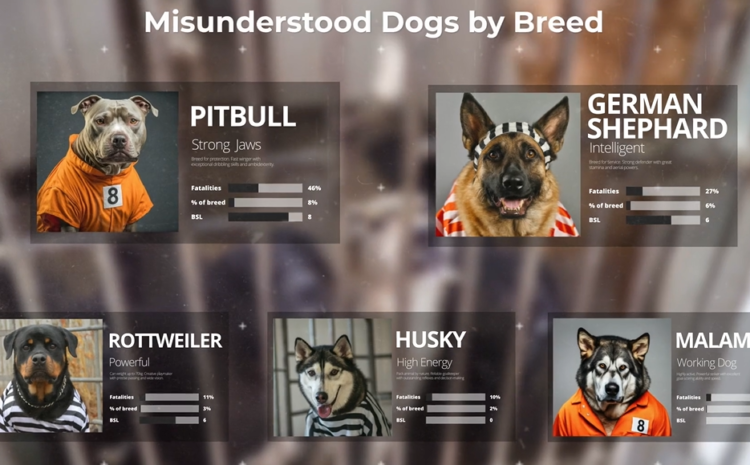
Dog Breeds That Get A Bad Rap For Insurance
The most misunderstood breeds
Fatal dog attacks are a tragic occurrence that can have profound impacts on families and communities. While all dogs have the potential to cause harm, certain breeds are more frequently associated with severe and sometimes fatal attacks. This article examines fatal attacks involving five breeds: Pit Bulls, German Shepherds, Rottweilers, Huskies, and Malamutes. We will also explore breed-specific legislation (BSL) in the United States and how these laws influence homeowners insurance policies.

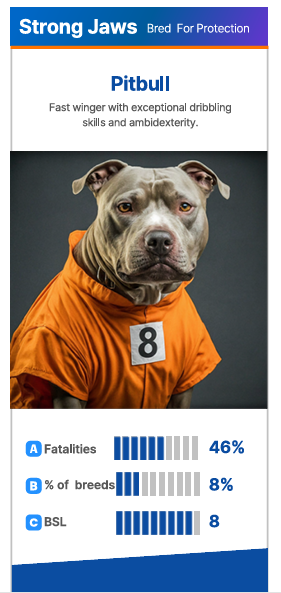
Pit Bulls
Pit Bulls are often highlighted in discussions about dangerous dog breeds. According to various studies and statistics, Pit Bulls are involved in a significant percentage of fatal dog attacks. The breed’s physical strength, combined with a strong bite force, can result in severe injuries or fatalities. While many Pit Bulls are well-behaved pets, their reputation has been shaped by instances of aggression, particularly in cases involving poorly trained or mistreated dogs.
German Shepherds
German Shephards are highly intelligent and versatile working dogs, often used in police and military roles. However, their strength and protective instincts can sometimes lead to aggressive behavior, especially if they are not properly socialized or trained. German Shepherds are involved in a smaller percentage of fatal attacks compared to Pit Bulls, but their size and power mean that attacks can be serious.
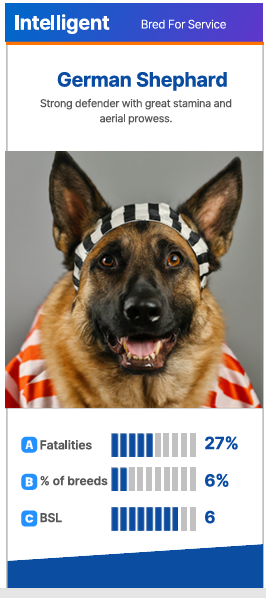
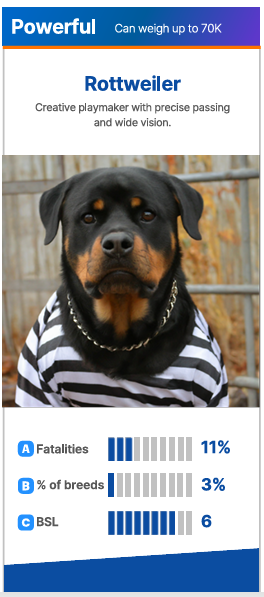
Rottweilers
Rottweilers are known for their strength and guarding instincts. They are involved in a number of fatal attacks, often attributed to their protective nature and territorial behavior. Like other breeds, Rottweilers require proper training and socialization to ensure they do not become aggressive. Due to their physical capabilities, Rottweilers can cause severe injuries or fatalities if they attac
Huskies
Huskies are known for their friendly demeanor and high energy levels. While they are generally considered good-natured dogs, Huskies have been involved in some fatal attacks, particularly involving children. These incidents are relatively rare but can be severe due to the Husky’s size and strength. Often, attacks involving Huskies are linked to inadequate training or lack of supervision.
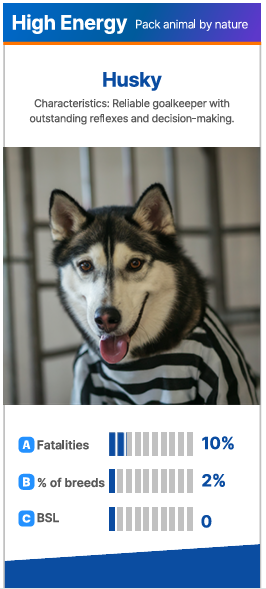
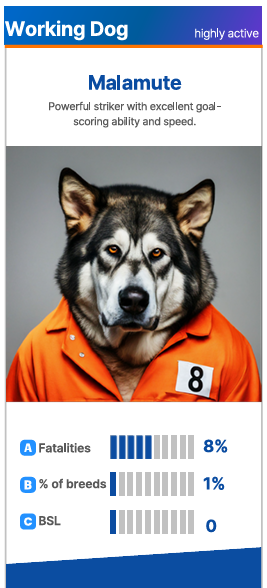
Malamutes
Similar to Huskies, Malamutes are strong, energetic dogs known for their sledding capabilities. While they are less frequently involved in fatal attacks compared to other breeds mentioned, Malamutes can still pose a risk if they are not properly trained or socialized. Their powerful build and pack mentality require owners to be vigilant in training and supervision.
Breed-Specific Legislation (BSL) in the United States
Breed-specific legislation (BSL) refers to laws or ordinances that restrict or regulate certain dog breeds deemed dangerous. These laws can include outright bans, mandatory muzzling, leash requirements, or increased insurance requirements for owners. The goal of BSL is to reduce the risk of dog attacks and enhance public safety.
States with Breed-Specific Legislation
While breed-specific legislation can vary widely, several states and municipalities have enacted laws targeting specific breeds, such as Pit Bulls and Rottweilers. Some states with notable BSL include:
- Ohio: Previously had statewide BSL targeting Pit Bulls, but this was repealed in 2012. However, several municipalities within Ohio continue to enforce breed-specific laws.
- Colorado: Denver is well-known for its long-standing ban on Pit Bulls, although this ban was repealed in 2021 with new regulations allowing Pit Bulls under specific conditions.
- Florida: Miami-Dade County has a ban on Pit Bulls that has been in place since 1989, although this has faced several challenges and calls for repeal.
- Missouri: Kansas City and other local jurisdictions have breed-specific ordinances primarily targeting Pit Bulls.
- Maryland: Previously had laws specifically targeting Pit Bulls, but these were modified in recent years to focus on individual dog behavior rather than breed.
BSL remains a contentious issue, with proponents arguing it helps reduce dog attacks, while opponents claim it unfairly targets specific breeds rather than addressing the root causes of aggression, such as poor training or neglect.
Impact of Dog Breeds on Homeowners Insurance
Homeowners insurance policies typically cover liability for dog bites and attacks. However, insurance companies may adjust their policies based on the perceived risk associated with certain dog breeds. Breeds that are statistically more likely to be involved in severe or fatal attacks, such as Pit Bulls, Rottweilers, and German Shepherds, often face higher premiums or exclusion clauses.
How Breed-Specific Legislation Affects Homeowners Insurance
BSL can impact homeowners insurance in several ways:
- Higher Premiums: Insurance companies may charge higher premiums for homeowners who own breeds considered high-risk, particularly in areas with breed-specific laws.
- Exclusions: Some insurance policies may exclude coverage for specific breeds, leaving homeowners without financial protection in the event of a dog attack.
- Policy Cancellation or Non-Renewal: In some cases, insurers may cancel or choose not to renew a policy if the homeowner acquires a breed considered dangerous under local laws.
These insurance implications can create additional financial burdens for dog owners and may influence their choice of pet or motivate them to invest in additional training and safety measures.
Conclusion
Fatal dog attacks are a serious concern, particularly involving breeds known for their strength and protective instincts. While breed-specific legislation aims to reduce these incidents, it remains a controversial approach. Homeowners should be aware of the potential impact of their dog breed on their insurance policies, as owning a breed perceived as high-risk can result in higher premiums, exclusions, or even policy cancellations. Responsible pet ownership, including proper training and socialization, is crucial in preventing dog attacks and ensuring a safe environment for both pets and people.

